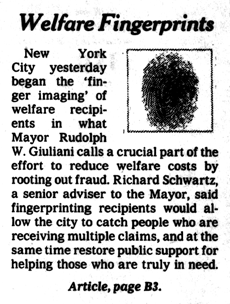 (New York Times, 1995 July 13)
(New York Times, 1995 July 13)
It is important to define a clear boundary between the needs of law enforcement and the privacy of law-abiding citizens.
The privacy, and even the safety of law abiding citizens is compromised with a central database of everyone's fingerprints. Such a central database, for example, would enable one with access to this data to falsely accuse someone of a crime, that is, to fabricate false evidence, and, at the very least, could be considered a violation of the privacy of the individuals concerned. It certainly violates the principle of self ownership.
Clearly, people need a means of proving their identity if they so desire (e.g. to obtain some benefit they seek).
Let us use self-ownership as a guide here: Suppose anyone could voluntarily go to their local police station, have their fingerprints transferred onto a tamper-proof card and signed by a police officer or other official there. The individual would retain this card, and no copy of it would be kept by the police or other officials involved.
This card would allow the individual to prove his or her identity without violating the of principle of self ownership.
Of course, if the teller doesn't want to press his or her finger onto your fingerprint sensor, he/she could well be part of a Trojan-horse bank. A trojan-horse bank is a bank run by criminals but masquerading as a branch of a major bank. The criminals lease a storefront, (perhaps in a shopping mall), under a false name, and ``seed'' the bank with cash. You or I, delighted that there is a new branch of our bank close by, enter to make a withdrawal, not knowning that the trojan bank reads off our account number, PIN, etc. A week later, the employees of the bank disappear without a trace, along with lots of cash withdrawn from other legitimate branches of the bank they pretended to be. Such a scam is described, for example, WIRED, NOVEMBER 1993, page 46. In some cases, criminals have also obtained security uniforms and infiltrated a real bank, doing essentially the same thing.
 .
.